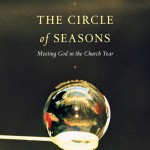We were late for library story time. Again. We were always late. For everything. As I pulled into the parking garage—it was almost always full at story time—I started praying for a parking spot. And God heard my cry and listened to my supplication. There was one spot left. Blazoned across the concrete floor of the garage in the middle of this spot was the word “compact.”
I drive a minivan.
But I was going to park in that space if it was the last thing I ever did because we…were…late! I nosed into the spot and backed out of it and nosed in and backed out and nosed in and backed out and nearly smashed the passenger side mirror into one of the concrete support posts and swore, loudly.
My daughter, who was five at the time and ever the helpful child, ventured to tell me that there was now another spot available and maybe I should try to park in it instead?
“Shut UP!” I yelled at her. “Don’t talk to me right now! Can’t you see I’m trying to park?!?”
Five years have passed since this incident, but I could tell you a hundred—or maybe a thousand—stories very like this one, stories in which I was anxious and harried, hurried and angry and unkind. That was the story of my life. Oh, sure, I had moments that weren’t rushed, but the overwhelming reality of my life was that I was usually somewhere else—or feeling like I ought to be somewhere else, doing something else. I wanted to be present in my life—and sometimes, thank God, I managed to be—but mostly I felt like I didn’t have time; there was simply too much to do. No matter where I was or what I was doing, it wasn’t where I was supposed to be or what I was supposed to be doing, and I felt anxious and hassled and frustrated and guilty.
I was wrecking on the rocks of all the shoulds clamoring for my attention—because I wasn’t lashed to the mast.
*****
In The Odyssey, Odysseus, on his way home from the Trojan War, meets with all kinds of perils and adventures, one of which is the island of the sirens whose song, he’s been warned, is so irresistible that on hearing it men fling themselves from their boats in their mad desire to reach the singers—only to be dashed by the waves against the cruel rocks of the island’s shore. Their bones lie bleached on those rocks, a testimony to the danger of the sirens’ song.
Odysseus, being who he is, decides he’s going to have it both ways: he’s going to listen to the siren’s song and he’s not going to die doing it. He gives his men wax to plug their ears so they can’t hear the song and orders them to tie him with thick rope to the mast of the ship and not to unbind him for any reason whatsoever until they are well past the island of the sirens. His scheme works—he gets to hear the sirens, and though he desperately tries to break his bonds to heed their call, his men cannot hear his cries to be unbound, and they row to safety. Lashing himself to the mast saved his life.
There are sirens in contemporary life, and they are every bit as alluring and deadly as the ones Odysseus heard. One of them is the siren of busyness. Another is the siren of hurry. Still another is the siren of restlessness, or acedia, that insists real life is happening somewhere else. I’m sure you can think of plenty more. These sirens lure us away from the safety of our boats and wreck us on their rocks. I lived my life for years, decades even, in wretched response to their lying clamor.
But not anymore. Now I know to lash myself to the mast. As a Christian, my mast is Jesus. I have to stay close to Him—I have to stay beyond close. I have to remain in Him. Of course I do. He Himself said, “Abide in my love. Apart from me you can do nothing” (John 15:9, 5). Indeed, apart from Him, I will die, wrecked on the rocks of the sirens.
I wish I could remember what started me lashing myself to the mast on a daily basis, but I don’t. Maybe it grew gradually out of other practices. However it came about, it seems to me this is the foundational practice for a happy life, and it’s very simple.
All you have to do is get yourself alone for a few minutes in a relatively quiet place (this may be the hardest part, yes?). Hide yourself in your closet or your bathroom if you have to. Sit in your car in the garage or a parking lot. Whatever it takes. I like to sit cross-legged and face east, toward the rising sun—to remind me of the risen Son—but this isn’t necessary.
Once you’re alone in a quiest(ish) place, close your eyes and take several deep breaths.
With each inhale, I imagine that I am breathing in the love of God. I imagine that love filling me from the top of my head to the tips of my toes.
With each exhale, I ask God to take everything in me that would block His love. I exhale my fear, anxiety, anger, pride, perfectionism, envy, self-righteousness, self-pity, scorn—anything and everything that restricts the flow of His love in my life, all that prevents me from receiving and living in His love (and it living in me!).
Sometimes I imagine Jesus before me, breathing on me as He breathed on His disciples—“Receive the Holy Spirit” (John 20:22). I imagine I am inhaling the Spirit that Jesus exhales.
That’s it. Simple, right?
But not easy. My thoughts are unruly and wander all over the place. I start thinking about other things and forget to consciously and deeply inhale and exhale. I start composing essays and stories in my head. I remember that I have to do x or y today or that I forgot to do x or y yesterday, and suddenly I feel anxious and harried.
Every time I become aware (there’s the gap!) that my thoughts have wandered away from Jesus and are striking out on the waves for the island of the sirens, I take a deep breath and once again consciously inhale the love of God. I exhale the distracting thoughts into Jesus’ hand. Sometimes I ask Him to burn them up in the fire of His holy love. If I find myself chastising myself for being so distracted, I give those thoughts to Jesus, too—they just get in the way of receiving His love—and take another deep, full breath, inhaling the Holy Spirit in whom I live and move and have my being.
I’ve found it helpful to pray Scripture as I consciously breathe in God’s love for me. (Here are some of my favorites.)
Remember habit 2? We talked about how God surrounds us like an atmosphere, like air. Just as the air around us enters our bodies and gives us life when we breathe it in, so too, Christ lives in us and gives us life when we breathe Him in. Lashing myself to the mast makes me aware of this reality. I’m always breathing, but I’m not always aware that I’m breathing. Christ is always with me and within me—but I’m not always aware of His presence. Taking full, deep, conscious breaths in which I imagine I am breathing in His love and mercy and grace—this helps me to remain present to the fact of His presence. It helps me to live more fully right where I am. It helps me to be happy right where I am because it helps me to see that God is present and active, right here, right now.
That’s habit four: lash yourself to the mast. Start every day with a deep breath of God’s love. During the day when you realize you’re feeling anxious or harried (habit 1) or the harpies are breathing down your neck (habit 3), stop and take a deep breath. Remember you live in Christ (habit 2), and breathe in His love like oxygen—because like oxygen, it is the vivifying force of your life. Over time, you will be surprised by the joy you find because you’re abiding in Christ.
Art: The Long Leg by Edward Hopper, 1935


